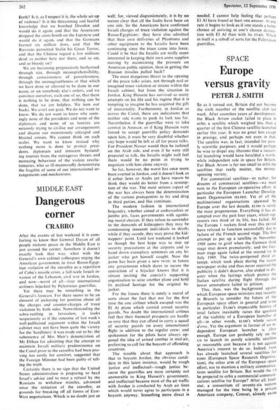MIDDLE EAST
Dangerous corner
CRABRO
After the events of last weekend it is com- forting to know that General Dayan of all people reckons peace in the Middle East is just around the corner. Somehow it doesn't exactly look that way, what with the General's own cabinet colleagues urging the American government to treat Russo-Egyp- tian violation of the ceasefire as a repetition of Cuba's missile crisis, a full-scale Israeli in- vasion of the Lebanon, civil war in Jordan, and now—worst of all—four international airliners hijacked by Palestinian guerrillas.
Yet there may be something in the General's forecast. For there seems to be an element of jockeying for position about all the charges and counter-charges of truce violation by both sides. Notwithstanding the sabre-rattling in Jerusalem, it looks suspiciously as if the outcome of last week's well-publicised argument within the Israeli cabinet may not have been quite the victory for the 'hardliners' it was made out to be: the vehemence of Mrs Meir's denunciation of Mr Ebban for admitting that the attempt to maintain Israeli military predominance on the Canal prior to the ceasefire had been pro- ving too costly for comfort, suggested that the Foreign Minister had been guilty of tell- ing the truth.
Certainly there is no sign that the United States administration is preparing to heed Israel's advice and to treat a refusal by the Russians to withdraw missiles, advanced since the initiation of the ceasefire, as grounds for breaking off all forms of East- West negotiations. Which is no doubt just as
well; for, viewed dispassionately, it is by no means clear that all the faults have been on one side. So the Americans have confirmed Israeli charges of truce violation against the Russo-Egyptians: they have also admitted that their own deliveries of Phantoms and
- other equipment to the Israelis have been continuing since the truce came into force. Could it be that the Israelis are really more interested in keeping their own arms supplies moving by maintaining the pressure on American public opinion, than in getting the Russian missiles- pulled back?
The most dangerous threat to the opening of the peace talks arises, not through real or imagined truce violation or strains within the Israeli cabinet, but from the situation in Jordan. King Hussein has survived so many attempts on his life and his regime that it is tempting to imagine he has acquired the gift of immortality. Furthermore, in Jordan as across the Canal, there are indications that neither side wants to push its luck too far. Nevertheless if the guerrillas were to take control in Amman, or if King Hussein were forced to accept guerrilla policy demands upon him, it must be very doubtful whether any hope would be left at all for peace talks. For President Nasser would then be isolated on the Arab side, and even if he were still prepared to talk, the Israelis might well feel there would be no point in trying to negotiate with him alone anyway.
So far, however, the worst has once more been averted in Jordan, and it doesn't look as if either Jews or Arabs yet have reason to think they would do better from a resump- tion of the war. The most serious aspect of the war has always been the determination of the various protagonists to try and drag in third parties, and this continues.
The modern fashion in international brigandry, whether aimed at ambassadors or jumbo jets, faces governments with agonis- ing moral choices. If they refuse to surrender to the demands of kidnappers they may be condemning innocent individuals to death; while if they accede, they may prove the kid- nappers' point. Until last weekend it looked as though the best hope was to step up security precautions at the airports and to hand down exemplary sentences on any hi- jacker who got himself caught. Now the game has been given a new twist; in future any government which dares to secure the conviction of a hijacker knows that it is almost inviting the convict's supporting organisation to seize another plane and hold its payload hostage for the original hi- jacker.
For the future there is surely a moral of sorts about the fact that not for the first time the one airliner which escaped was the El Al plane which carried armed security guards. No doubt the international airlines feel that their financial prospects are hardly so rosy that they can afford to carry a squad of security guards on every international flight in addition to the regular crew; and spokesmen for the pilots have always op- posed the idea of armed combat in mid-air, preferring to call for the boycott of offending countries.
The trouble about that approach is that to boycott Jordan, the obvious candi- date in this latest instance, would be rough justice and ineffectual—rough justice be- cause the guerrillas are most certainly not answerable to King Husseifl's government, and ineffectual because most of the air traffic with Jordan is conducted by Arab air lines which would never agree to participate in a boycott anyway. Something more direct is needed. I cannot help feeling that perhaps El Al have found at least one answer. At any rate it begins to look as if one stands a better chance of arriving at one's chosen destina- tion with El Al than with its rivals. Which in itself is a rebuff of sorts for the Palestinian guerrillas.














































 Previous page
Previous page